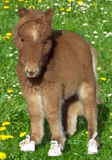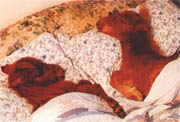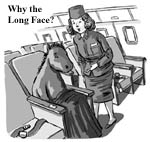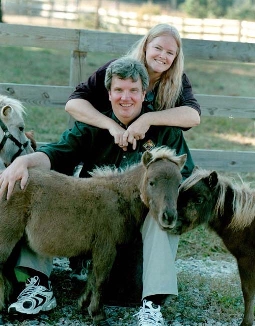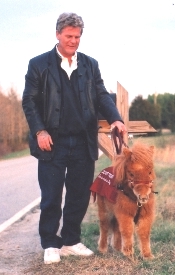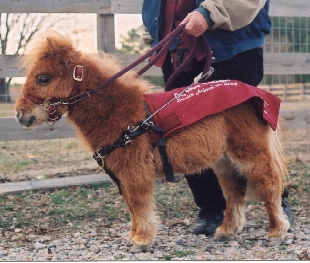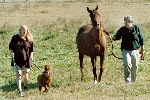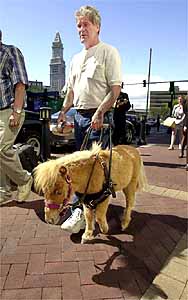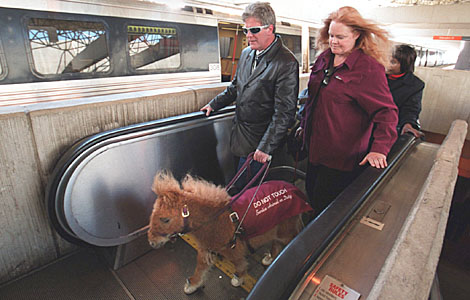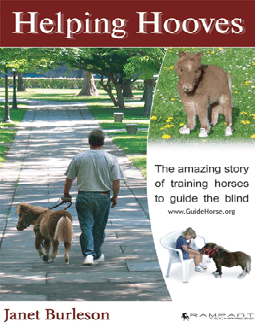|
|
Hooves
that Help: Guide Horses Aid the Blind
|
by: Alex
Lieber
|
|
 |
|
|
|
 |
 |
 |
 |
Guide
horses can ride in vehicles, elevators, or any
conveyance that a dog can. Photo courtesy of the Guide
Horse Foundation, www.guidehorse.org |
 |
Guide dogs
have helped the blind to lead independent lives for decades.
Unfortunately, the life span of the individual dog is usually
between 10 and 15 years. That means a blind person may outlive
two, three, even four dogs in his or her lifetime.
Moreover, these animals are more than just guide tools – they
become members of the person's family. When one dies, the heart
breaks. For these and other reasons, people are becoming excited
with the prospect of a new guide animal on the scene: miniature
horses.
A miniature horse is a smaller type of equine, usually no taller
than 34 inches at the withers, though standards vary with
different miniature horse registries. In the past year or so,
guide horses have gained attention through the media, but the
program is still very new and somewhat experimental. However,
because miniature horses can live between 25 and 35 years, their
use as guide animals shows tremendous promise.
The Guide Horse Foundation, located in Kittrell, N.C., raises
and trains the horses for the blind. Currently, Don and Janet
Burleson, who started the foundation, has placed two horses.
More are on the way.
The couple got the idea when they visited New York City in 1999.
They rode two horses in the busy city streets and were impressed
with the animals' calm in traffic and ability to follow commands
with the city's bedlam going on around them.
They taught their own 24-inch miniature horse, Twinkie, to lead
a blind person in a shopping area. The experiment worked, and
training on more miniature horses began. In all, 10 horses are
being trained to be donated to blind people.
Miniature horses are just that – smaller versions of horses.
They are not considered ponies because they have the proportions
and character of a horse. They are generally under 34 inches at
the withers.
They have been bred for several hundred years for size and for
calm dispositions. Like their larger cousins, miniature horses
possess life spans that range between 25 and 35 years. (The
oldest recorded is actually 50 years.)
There are about 150,000 miniature horses registered by various
organizations in the United States. In the past, their purpose
has been primarily for enjoyment.
The nonprofit foundation does not intend to compete with guide
dogs; instead it offers an alternative to certain people:
- Horse lovers
- Those allergic to traditional guide animals
- People with a fear of dogs
- People who prefer a guide animal that does not have
to live in the house
According to the Guide Horse Foundation Web site, trained
horses are very calm in noisy, stressful situations, one of
major reasons why police use horses to help control large,
unruly crowds. Horses also have very good memories and can
focus well on their work. They do not crave attention as a
dog does, and they remain calm when petted or groomed.
These horses can live in a barn or even in the home because
they are easy to housetrain. Horses that are accepted into
the program must be no heavier than 55 pounds, the weight of
a medium-sized dog, and no higher than 26 inches high at the
withers.
As with guide dogs, only miniature horses that possess the
right temperament and intelligence are accepted into the
program. Horses that spook easily are not accepted. Training
usually takes 6 months to a year, and can begin as early as
when they are 6 months old.
The horses can ride in vehicles, elevators or any conveyance
that a dog can. The American Disabilities Act ensures that
people with guide horses have the same access as those with
guide dogs. They are also compatible with well-socialized
pets.
For more information on guide horses, or to learn how you
can make a donation, you can visit the foundation at www.guidehorse.org
.
|
|
|
|
|
